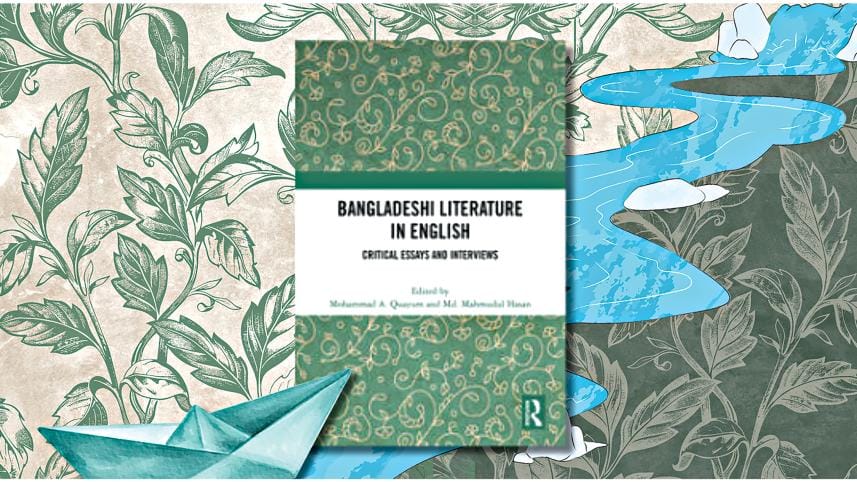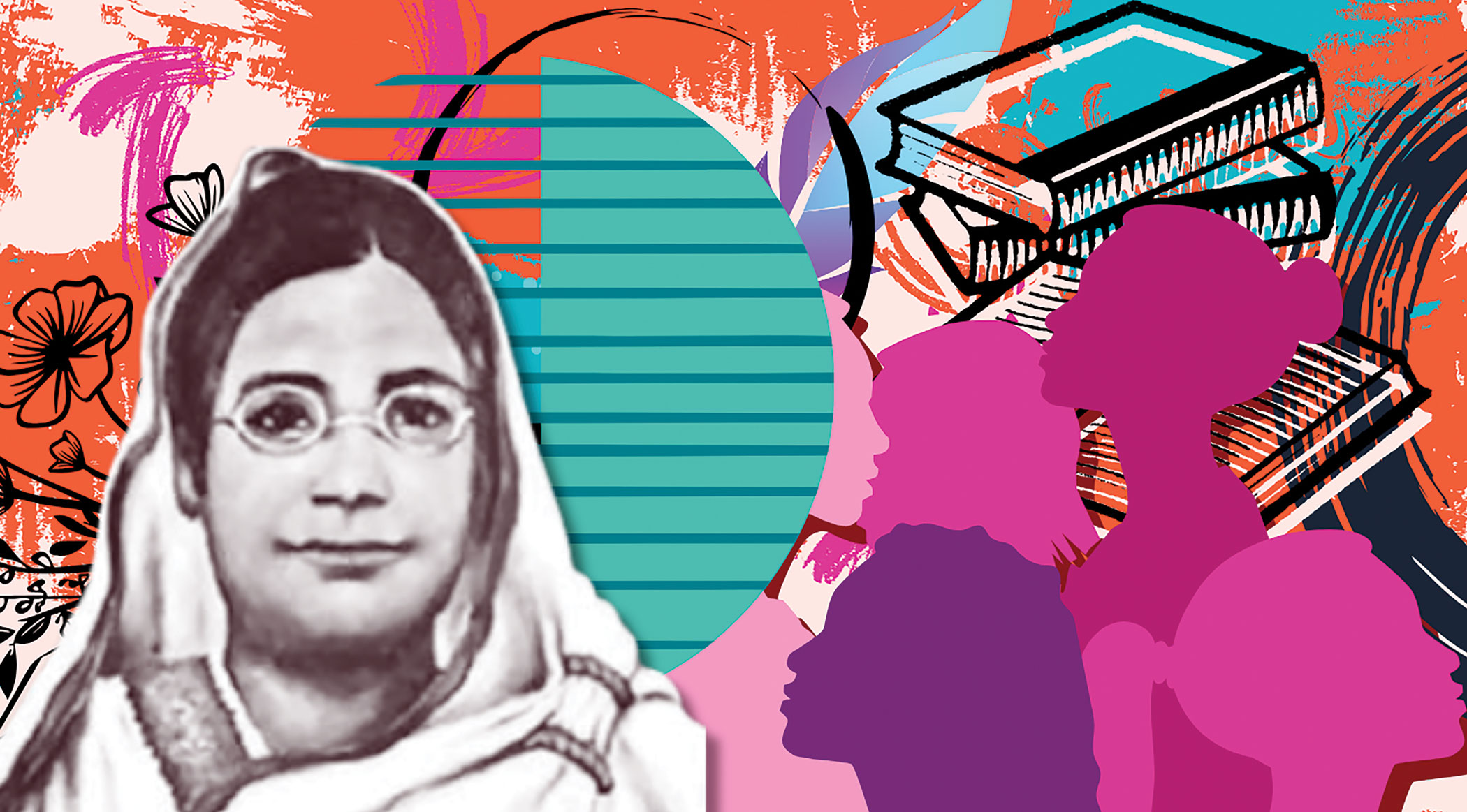'Thrice born': The journey of Bangladeshi literature in English

Bangladeshi Literature in English: Critical Essays and Interviews, edited by Mohammad A. Quayum and Md. Mahmudul Hasan, focuses on critical essays on Bangladeshi literature in English—both from Bangladesh and its diasporas (US, UK, and Australia). Until recently, there was hardly any anthology or edited volume in English that one could access if one were to look for a collection of essays on Bangladeshi literature in English. Thus, Bangladeshi Literature in English as an edited collection with five chapters written by seasoned and young scholars fills that gap. It also has two interviews—one of Kaiser Haq and the other of Monica Ali. The writers of the chapters used an amalgamation of theorists, from Franz Fanon and Michel Foucault to Rob Nixon.
The introduction gives an overview of the history of literary evolutions in the South Asian continent, from the colonial period through and after the Partition of 1947 to the independence of Bangladesh in 1971. The editors use the phrase "thrice born" (ensuring readers do not confuse it with the twice-born concept in Hinduism) to discuss the Bangladeshi English literary journey in the Indian subcontinent. The introduction is succinct and helpful for new scholars. The editors also mention the challenges of English writing in Bangladesh. In addition, they contend that even if works are coming out, lack of publishers and the inability to cross the borders and grasp the readers are some of the reasons for these books not enjoying the popularity that they should (many of these issues are again highlighted by Kaiser Haq in his interview with Mohammad A. Quayum). However, the authors mention that diasporic writers receive the highlights.
While the first two chapters focus on the colonial period, chapter three, which Kathryn Hummel writes, brings the readers to the present time with the analysis of Kaiser Haq's poems. Haq is very popular in "dui Bangla", meaning both in West Bengal and Bangladesh and thus, scholars from both sides of the border have worked with and written about him.
Md. Mahmudul Hasan's first chapter is titled "Muslim Bengal writes back: Rokeya's encounter with the representation of Europe". In it he talks about the first Muslim feminist from South Asia, Rokeya Sakhawat Hossain, and her interpretative summary of Marie Corelli's novel, The Murder of Delicia (Kessinger Publishing, 1996). Hasan argues that she created a bridge between Muslim Bengal and England through her summary of Corelli's novel. The chapter provides a new direction where Hasan compares Corelli and Hossain to talk about gender norms both in India and England. The author's focus is on the commonalities between the two and the fact that both Indian women and British women faced the same kinds of subjugation as Britain brought its Victorian moral values to the Indian subcontinent. This chapter will complement those abroad who teach Hossain's Sultana's Dream (1905).
Hasan's second chapter, "Panchayat and colonialism in Humayun Kabir's Men and Rivers", has several diverse aspects. Hasan not only does a comparative study to discuss the panchayat in Humanyun Kabir's Men and Rivers (1945) but also uses critics like Franz Fanon and Mary Luis Pratt to present the multiple "contact zones" in a small village during the colonial period. The author argues that Kabir critiques the colonial influence in destroying the lives of the peasants as they struggle to understand the strength of bribery and theft by middle managers. Kabir presents the non-volant nature of the peasants at a time when India saw peasant movements. The chapter does an elaborate analysis of the characters and their multiple relations with the different constituents of the village to talk about the socio-political lives of the villagers.
While the first two chapters focus on the colonial period, chapter three, which Kathryn Hummel writes, brings the readers to the present time with the analysis of Kaiser Haq's poems. Haq is very popular in "dui Bangla", meaning both in West Bengal and Bangladesh and thus, scholars from both sides of the border have worked with and written about him. Hummel argues that Haq is a transnational local who talks about home without going far away from home. Haq's resistance against colonial mimicry involves writing about the most mundane things you see in Bangladesh, such as lungi or stray dogs. The chapter brings about the multifaced nature of Haq's poetry.
"Toxic grace? Tahmima Anam's The Bones of Grace and the pollution trade" is written by Md. Alamgir Hossain. The importance of this chapter in this collection is noteworthy because Anam's Bones has not received the attention it should have in South Asia. Sometimes it is hard to get out of the India-centric Amitav Gosh environmental novels, and there are reasons for that—people are willing to talk about the issues Gosh writes about. Using Rob Nixon's work as a theoretical lens, Hossain weaves in the problems that we should be concerned about—the countries of the Global South as the dumping grounds for things that the Global North discards. Hossain's chapter opens a new venue to see a Bangladeshi diasporic writer writing about environmental disasters. This chapter would complement any syllabi that focus on the environmental issues of the Global South.
Zia Haider Rahman, the focus of chapter five, is another Bangladeshi writer in English whose work has been written about extensively. Like Haq, he crosses borders when it comes to analysing his works. In this chapter, "Beyond national(ist) binaries: The case of Zia Haider Rahman's In the Light of What we Know", Md Rezaul Haque gives a background of the war of 1971. He also questions what role a nation-centred or nationalist discourse plays when presenting different groups of people in different narratives. For example, how do non-Bangalis appear in literature? A contested and controversial issue about the role of the non-Bangalis is a topic of many recent critical essays as more and more scholars are trying to voice the marginalisation of the different groups of people in the 1971 war narratives.
Mohammad A. Quayum's interview with Kaiser Haq brings out the problems of not having more anglophone literature in Bangladesh. Haq thinks that the fear of apasankriti drives writers away from writing in English. He talks about his background—growing up in an English-medium school and how that encouraged him to write in English. He mentions the teacher in his school who infused critical appreciation of a poem in the classroom and Haq's desire to see "the music in free verse". He refers to a plethora of English writers who have influenced him. In his response to Quayum's query about the sustainability of subcontinental English, Haq says that literature will exploit various forms of English. He writes that translating works into English "enhances our critical awareness of the complexities of our cultural inheritance".
Sadaf Saaz's interview with Monica Ali centres around their conversation on the book, Love Marriage (2022). Ali's conversation with Saaz revolves around British society and its outlook on class and race. Saaz also asks Ali questions about the differences between generations of immigrant communities. Ali's main character, Yasmin, deals with multiple aspects of her personal and public life as a doctor. Ali candidly tells Saaz that this novel is not only about marriage but also about sex, infidelity, and sexual violence. Ali reflects on not being a writer of a particular type—only writing about Bangladesh because she has a connection to it.
The book will benefit scholars, Bangladeshi, as well as other South Asians and their diasporas, who are looking for a set of critical articles on Bangladeshi Literature in English. Although numerous critics have written on Rokeya Sakhawat Hossain, Kaiser Haq, or Zia Haider Rahman, the essays focusing on these writers in this collection have something new to add. Therefore, I am glad to have read the book and recommend it to those interested in teaching and researching Bangladeshi Literature in English.
Umme Al-wazed is Professor of English and Dean of Humanities at Augustana College, Rock Island, IL, USA.



 For all latest news, follow The Daily Star's Google News channel.
For all latest news, follow The Daily Star's Google News channel. 

Comments